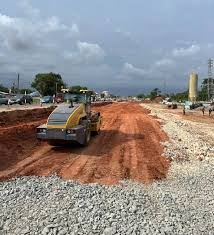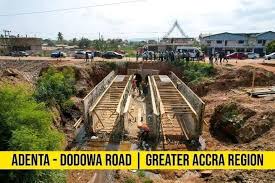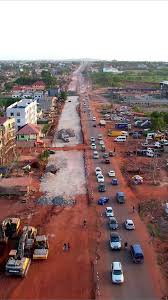By Kwabena Asare Darko
The dust comes before the sunrise now.
It creeps in quietly—through windows, under doors, coating every surface, every breath, every hope along the Adenta–Dodowa Road. What was once a community waiting eagerly for a new, smooth highway has become a people trapped in a cloud of neglect, abandoned by a project that was meant to improve their lives.
Today, the road stands half-dug, half-finished, half-forgotten. And the people who live along it are paying a price far heavier than they ever imagined.
“My children cough until they cry.”
For Abena, a mother of two living near Prison Junction, the dust is not just an inconvenience—it is an enemy. Her youngest daughter wakes up coughing every morning, her tiny chest straining for air. By noon, the child’s eyes turn red from irritation, and the fan runs endlessly to offer a small, temporary relief.
“I wash my curtains every two days,” Abena says, her voice shaking. “But the dust still wins. It lives inside the house now… it lives inside our lungs.”
She pauses and looks toward the grey-brown haze hovering outside her window.
“We were promised development. But this—this feels like punishment.”
A grandmother struggles to breathe
In another home just meters away, 74-year-old Madam Owusu grips her chest as she speaks. She battles hypertension, a condition now made worse by the fumes, noise, and unending stress of living beside a project that has been abandoned.
“When the trucks used to come, at least we knew the road would be fixed,” she says.
“Now they are gone… and we are left in the middle of a dust storm.”
Businesses are dying slowly too
Madam Aku, who runs a small grocery shop by the roadside, wipes a thin film of dust off her products every hour. Customers no longer stop freely—they fear leaving covered in the same dusty powder that settles on her shelves.
“Every day I lose money,” she says. “People don’t want to buy bread or drinks that look dirty. And I don’t blame them.”
Her tone shifts—anger, exhaustion, resignation blending together.
“The government does not know what we are going through. Or maybe they know… and simply don’t care.”
Drivers are losing more than patience
Taxi drivers, trotro operators, and private motorists all share one complaint:
their vehicles are dying slowly.
Broken shock absorbers. Damaged exhausts. Dust-choked filters.
Spare parts are being replaced almost weekly.
“It feels like we are working just to maintain our cars,” says Kofi, a taxi driver. “Every day on this road is another repair.”
A stalled project, a suffering people
The contractor once arrived each morning with heavy machines—rollers, milling equipment, graders. The community watched progress with cautious hope.
And then one day, the machines left.
And they never came back.
Government payments allegedly stopped. Work halted. And the dreams of the people were left buried under gravel and thick, choking dust.
Now, the loose earth lies exposed, and every passing vehicle lifts clouds that settle on everything—food, clothes, lungs, dreams.
“We don’t want miracles. We just want to breathe.”
Community leaders have begged for intervention—for dust suppression, for clear communication, for even the slightest sign that someone in authority remembers them.
Sometimes a water tanker appears to spray the road, but it is inconsistent, almost symbolic.
For the people who live here, it feels like their suffering has been made invisible.
They are left in silence.
They are left in sickness.
They are left feeling forgotten.
A call that cannot be ignored
The abandoned Adenta–Dodowa Road is no longer just an incomplete project.
It is a public health crisis.
A financial burden.
An emotional wound.
And it is breaking the spirit of the communities forced to live in the fallout of government inaction.
“We just want our lives back,” Abena whispers.
“Before the dust. Before the coughing. Before the silence.”
Until the machines return and the work resumes, the dust will continue to rise—settling not only on homes and streets, but on the hearts of the people who call this place home.
By Kwabena Asare Darko





